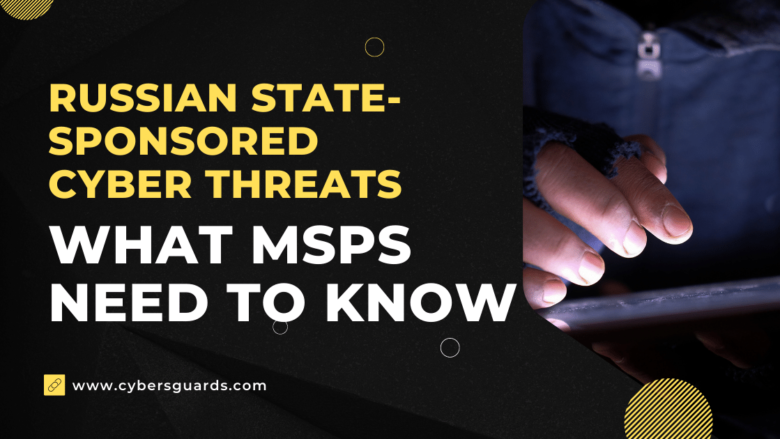Russian State-Sponsored Cyber Threats have been in the news a lot lately. As an MSP, you need to be aware of these threats and how they could impact your clients’ networks. Russian cyber attacks on Ukraine have shown that Russian hackers are capable of launching sophisticated and devastating attacks. In this blog post, we will discuss Russian State-Sponsored Cyber Threats and what you can do to protect your clients’ networks from them.
Russian State-Sponsored Cyber Threats: An Overview
Russian State-Sponsored Cyber Threats are a growing concern for businesses and organizations around the world. Russian hackers have been linked to a number of high-profile cyber attacks, including the infamous NotPetya attack that caused billions of dollars in damage. Russian state-sponsored hackers are also believed to be behind the recent cyberattack on the Ukrainian power grid. These attacks have shown that Russian hackers can launch sophisticated and devastating attacks.
As a Cyber Security Provider, we know how important it is to stay aware of these threats and how they could impact your clients’ networks. In this blog post, we will discuss Russian State-Sponsored Cyber Threats and what you can do to protect your clients’ networks from them.
High Profile Activity by Russian State Sponsored Threat Actors
GTsST is the Russian government’s primary cyber threat actor. This group has been linked to several high-profile cyber attacks. GTsST conducted high-profile cyber operations against a wide range of targets, including Ukrainian and Russian critical infrastructure, foreign governments, and private sector entities. The group’s toolset includes variants of the KillDisk and Industroyer malware that were used in past attacks. GTsST (has been active since at least 2015 and is believed to be responsible for the NotPetya attack in 2017.
In 2018, GTsST was behind a cyberattack on the Ukrainian power grid that caused widespread blackouts. This attack was notable for its use of new malware, dubbed CrashOverride, that was designed specifically for disrupting industrial control systems.
CrashOverride is a modular malware framework that includes components for reconnaissance, weaponization, and delivery. It is believed to be the first malware toolkit designed specifically for attacks on industrial control systems. The fact that this toolkit was created by a Russian state-sponsored hacking group raises serious concerns about the possibility of future attacks on critical infrastructure around the world.
Potential Risks to SMB Clients
Russian State-Sponsored Cyber Threats pose a serious risk to small and medium-sized businesses (SMBs). Russian hackers have been known to target SMBs in order to gain access to their networks. Once they have gained access, they can then launch attacks on larger businesses and organizations. Russian state-sponsored hackers have also been known to use SMBs as a foothold for launching attacks on other countries.
SMBs need to be aware of these risks and take steps to protect their networks. MSPs can play a key role in helping SMBs to protect themselves from Russian State-Sponsored Cyber Threats.
How to Protect Your Clients’ Networks from Russian State-Sponsored Cyber Threats
As an MSP, you need to be aware of Russian State-Sponsored Cyber Threats and how they could impact your clients’ networks. Russian hackers have been linked to several high-profile cyber attacks, and they are capable of launching sophisticated and devastating attacks. Russian state-sponsored hackers are also willing to target critical infrastructure.
To protect your clients’ networks from Russian State-Sponsored Cyber Threats, you should implement the following security measures:
– Use a multi-layered approach to security. Russian hackers are known for their sophisticated and targeted attacks. A multi-layered approach to security will help to protect your clients’ networks from these types of attacks.
– Implement strong access control measures. Russian state-sponsored hackers have been known to target SMBs to gain access to their networks. Implementing strong access control measures will help to prevent Russian hackers from gaining access to your clients’ networks.
– Keep your clients’ systems up to date. Russian hackers have been known to exploit vulnerabilities in outdated software. Keeping your clients’ systems up to date will help to reduce the risk of Russian hackers being able to exploit these vulnerabilities.
– Educate your clients’ employees. Russian hackers often use social engineering techniques to trick employees into giving them access to networks. Educating your clients’ employees about Russian State-Sponsored Cyber Threats will help them to be more aware of these risks and less likely to fall for these types of attacks.
By taking these precautions, you can help to protect your clients’ networks from Russian State-Sponsored Cyber Threats. Information Security is more crucial than ever these days, and MSP’s need to be prepared to protect their clients.
Conclusion: Stay vigilant against Russian state-sponsored cyber threats!
Russian state-sponsored cyber threats are a serious problem that all MSPs need to be aware of. By taking some simple precautions, you can help to protect your clients’ networks from these threats. Stay vigilant and stay informed!










FIND US ON SOCIALS